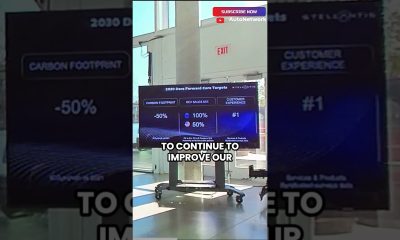Business
GOP Bill Would Undermine Auto, Rail Safety Regulations

In this May 12, 2105 file photo, emergency personnel work the scene of a deadly train wreck in Philadelphia. (AP Photo/ Joseph Kaczmarek, File)
Joan Lowy and John Krishner, ASSOCIATED PRESS
WASHINGTON (AP) — At a time of record auto recalls and high-profile train wrecks, Republicans are working on legislation to roll back safety regulation of the auto and railroad industries.
A bill approved this week on a party-line vote by a Senate committee brims with industry-sought provisions that would block, delay or roll back safety rules. The measure is to be part of a must-pass transportation bill that GOP leaders hope to put to a vote in the Senate as early as next week.
They are under pressure to act quickly because authority for transportation programs expires on July 31. Without a cash infusion, the government will have to delay highway and transit aid to states.
One provision would block a new Department of Transportation rule requiring that trains hauling crude oil are equipped with electronically controlled brakes that affect cars all at the same time, rather than sequentially. The bill calls for a study of the technology and puts off any regulatory mandate, which could delay implementation for years.
The brake rule was prompted by a series of train wrecks in which cars of crude oil and ethanol exploded, igniting fires that burned for days. Freight railroads oppose the rule, which could cost them billions of dollars.
Another provision would give freight and commuter railroads and Amtrak more time to install a safety system called positive train control. The technology relies on GPS, wireless radio and computers to monitor train position and slow or stop trains in danger of derailing because they’re traveling too fast, are about to collide with another train or are about to enter an area where crews are working on tracks.
A 2008 law requires railroads to have the technology installed and operating by the end of this year. Most are not expected to make that deadline.
The National Transportation Safety Board says that if the technology had been in operation, it could have prevented an Amtrak derailment in May that killed eight people and injured about 200 others in Philadelphia, and a derailment that killed four passengers and injured 64 others in New York City in December 2013, as well as other fatal accidents.
Railroads say they have spent billions of dollars on the technology but have been hampered by technical and financial difficulties and need more time.
The bill would effectively allow states to lower the qualifying age for interstate commercial truck drivers from 21 to 18. The provision was sought by the trucking industry, which says there is a shortage of drivers.
Another provision sought by the industry would require the Federal Motor Carrier Safety Administration to remove safety ratings of truck and bus companies from its public website. The companies disagree with the methodology the agency uses for the ratings.
The bill would impose requirements on the motor carrier agency that safety advocates say could stymie new safety regulations by making an already lengthy rulemaking process even more difficult.
Following record auto recalls last year totaling almost 64 million vehicles, the National Highway Traffic Safety Administration asked that its staff be increased and the limit on fines levied on offending automakers be raised to $300 million, from the current $35 million.
The Senate Commerce, Science and Transportation Committee agreed to increase the agency’s budget, but only after it satisfies 17 recommendations made by the Transportation Department’s inspector general. The maximum fine would double to $70 million, but only after the agency comes out with regulations identifying all the factors that go into calculating fines. The conditions could effectively delay action on both matters by a year or more.
Two GOP presidential candidates on the committee — Sens. Marco Rubio of Florida and Ted Cruz of Texas — didn’t attend the meeting while the bill’s provisions were being voted upon. However, the chairman, Sen. John Thune, R-S.D., cast proxy votes for them on amendments and for Cruz on final passage of the bill. Rubio voted in person in favor of passage of the bill. Several Democrats joined GOP senators in opposing changes to controversial provisions.
Thune and other Republicans on the committee said the changes were necessary reforms to federal agencies that have overstepped their bounds or have issued regulations that unfairly penalize industry without improving safety. Thune noted the bill contains several provisions sought by Democrats and safety advocates.
One of the biggest would prevent rental car agencies from renting vehicles that are under a safety recall, but have not been repaired. Initially, the bill had said rental car agencies could rent unrepaired cars if they first informed customers. Other provisions would make it easier for states to qualify for federal grants to tackle drunk driving, promote seatbelt use and address other safety issues, and start a pilot program to inform motorists of recalls when they register their cars.
That was not enough to sweeten the bill for safety advocates.
The GOP bill is “loaded down with giveaways to special interests that will set back safety for years to come,” said Jackie Gillan, president of Advocates for Highway and Auto Safety. “The influence of corporate lobbyists had more sway than commonsense and cost-effective solutions to deadly problems.”
___
Krisher reported from Detroit.
___
Follow Joan Lowy on Twitter at http://www.twitter.com/AP_Joan_Lowy and Tom Krisher at http://www.twitter.com/tkrisher.
Copyright 2015 The Associated Press. All rights reserved. This material may not be published, broadcast, rewritten or redistributed.
###
Bay Area
State Controller Malia Cohen Keynote Speaker at S.F. Wealth Conference
California State Controller Malia Cohen delivered the keynote speech to over 50 business women at the Black Wealth Brunch held on March 28 at the War Memorial and Performing Arts Center at 301 Van Ness Ave. in San Francisco. The Enterprising Women Networking SF Chapter of the American Business Women’s Association (ABWA) hosted the Green Room event to launch its platform designed to close the racial wealth gap in Black and Brown communities.

By Carla Thomas
California State Controller Malia Cohen delivered the keynote speech to over 50 business women at the Black Wealth Brunch held on March 28 at the War Memorial and Performing Arts Center at 301 Van Ness Ave. in San Francisco.
The Enterprising Women Networking SF Chapter of the American Business Women’s Association (ABWA) hosted the Green Room event to launch its platform designed to close the racial wealth gap in Black and Brown communities.
“Our goal is to educate Black and Brown families in the masses about financial wellness, wealth building, and how to protect and preserve wealth,” said ABWA San Francisco Chapter President LaRonda Smith.
ABWA’s mission is to bring together businesswomen of diverse occupations and provide opportunities for them to help themselves and others grow personally and professionally through leadership, education, networking support, and national recognition.
“This day is about recognizing influential women, hearing from an accomplished woman as our keynote speaker and allowing women to come together as powerful people,” said ABWA SF Chapter Vice President Velma Landers.
More than 60 attendees dined on the culinary delights of Chef Sharon Lee of The Spot catering, which included a full soul food brunch of skewered shrimp, chicken, blackened salmon, and mac and cheese.
Cohen discussed the many economic disparities women and people of color face. From pay equity to financial literacy, Cohen shared not only statistics, but was excited about a new solution in motion which entailed partnering with Californians for Financial Education.
“I want everyone to reach their full potential,” she said. “Just a few weeks ago in Sacramento, I partnered with an organization, Californians for Financial Education.
“We gathered 990 signatures and submitted it to the [California] Secretary of State to get an initiative on the ballot that guarantees personal finance courses for every public school kid in the state of California.
“Every California student deserves an equal opportunity to learn about filing taxes, interest rates, budgets, and understanding the impact of credit scores. The way we begin to do that is to teach it,” Cohen said.
By equipping students with information, Cohen hopes to close the financial wealth gap, and give everyone an opportunity to reach their full financial potential. “They have to first be equipped with the information and education is the key. Then all we need are opportunities to step into spaces and places of power.”
Cohen went on to share that in her own upbringing, she was not guided on financial principles that could jump start her finances. “Communities of color don’t have the same information and I don’t know about you, but I did not grow up listening to my parents discussing their assets, their investments, and diversifying their portfolio. This is the kind of nomenclature and language we are trying to introduce to our future generations so we can pivot from a life of poverty so we can pivot away and never return to poverty.”
Cohen urged audience members to pass the initiative on the November 2024 ballot.
“When we come together as women, uplift women, and support women, we all win. By networking and learning together, we can continue to build generational wealth,” said Landers. “Passing a powerful initiative will ensure the next generation of California students will be empowered to make more informed financial decisions, decisions that will last them a lifetime.”
Business
Black Business Summit Focuses on Equity, Access and Data
The California African American Chamber of Commerce hosted its second annual “State of the California African American Economy Summit,” with the aim of bolstering Black economic influence through education and fellowship. Held Jan. 24 to Jan. 25 at the Westin Los Angeles Airport Hotel, the convention brought together some of the most influential Black business leaders, policy makers and economic thinkers in the state. The discussions focused on a wide range of economic topics pertinent to California’s African American business community, including policy, government contracts, and equity, and more.

By Solomon O. Smith, California Black Media
The California African American Chamber of Commerce hosted its second annual “State of the California African American Economy Summit,” with the aim of bolstering Black economic influence through education and fellowship.
Held Jan. 24 to Jan. 25 at the Westin Los Angeles Airport Hotel, the convention brought together some of the most influential Black business leaders, policy makers and economic thinkers in the state. The discussions focused on a wide range of economic topics pertinent to California’s African American business community, including policy, government contracts, and equity, and more.
Toks Omishakin, Secretary of the California State Transportation Agency (CALSTA) was a guest at the event. He told attendees about his department’s efforts to increase access for Black business owners.
“One thing I’m taking away from this for sure is we’re going to have to do a better job of connecting through your chambers of all these opportunities of billions of dollars that are coming down the pike. I’m honestly disappointed that people don’t know, so we’ll do better,” said Omishakin.
Lueathel Seawood, the president of the African American Chamber of Commerce of San Joaquin County, expressed frustration with obtaining federal contracts for small businesses, and completing the process. She observed that once a small business was certified as DBE, a Disadvantaged Business Enterprises, there was little help getting to the next step.
Omishakin admitted there is more work to be done to help them complete the process and include them in upcoming projects. However, the high-speed rail system expansion by the California High-Speed Rail Authority has set a goal of 30% participation from small businesses — only 10 percent is set aside for DBE.
The importance of Diversity, Equity and Inclusion (DEI) in economics was reinforced during the “State of the California Economy” talk led by author and economist Julianne Malveaux, and Anthony Asadullah Samad, Executive Director of the Mervyn Dymally African American Political and Economic Institute (MDAAPEI) at California State University, Dominguez Hills.
Assaults on DEI disproportionately affect women of color and Black women, according to Malveaux. When asked what role the loss of DEI might serve in economics, she suggested a more sinister purpose.
“The genesis of all this is anti-blackness. So, your question about how this fits into the economy is economic exclusion, that essentially has been promoted as public policy,” said Malveaux.
The most anticipated speaker at the event was Janice Bryant Howroyd known affectionately to her peers as “JBH.” She is one of the first Black women to run and own a multi-billion-dollar company. Her company ActOne Group, is one of the largest, and most recognized, hiring, staffing and human resources firms in the world. She is the author of “Acting Up” and has a profile on Forbes.
Chairman of the board of directors of the California African American Chamber of Commerce, Timothy Alan Simon, a lawyer and the first Black Appointments Secretary in the Office of the Governor of California, moderated. They discussed the state of Black entrepreneurship in the country and Howroyd gave advice to other business owners.
“We look to inspire and educate,” said Howroyd. “Inspiration is great but when I’ve got people’s attention, I want to teach them something.”
Activism
Oakland Post: Week of April 17 – 23, 2024
The printed Weekly Edition of the Oakland Post: Week of April 17 – 23, 2024

To enlarge your view of this issue, use the slider, magnifying glass icon or full page icon in the lower right corner of the browser window. ![]()
-

 Activism4 weeks ago
Activism4 weeks agoOakland Post: Week of March 27 – April 2, 2024
-

 #NNPA BlackPress4 weeks ago
#NNPA BlackPress4 weeks agoCOMMENTARY: D.C. Crime Bill Fails to Address Root Causes of Violence and Incarceration
-

 #NNPA BlackPress4 weeks ago
#NNPA BlackPress4 weeks agoFrom Raids to Revelations: The Dark Turn in Sean ‘Diddy’ Combs’ Saga
-

 #NNPA BlackPress4 weeks ago
#NNPA BlackPress4 weeks agoCOMMENTARY: Lady Day and The Lights!
-

 #NNPA BlackPress4 weeks ago
#NNPA BlackPress4 weeks agoMayor, City Council President React to May 31 Closing of Birmingham-Southern College
-

 #NNPA BlackPress4 weeks ago
#NNPA BlackPress4 weeks agoBaltimore Key Bridge Catastrophe: A City’s Heartbreak and a Nation’s Alarm
-

 #NNPA BlackPress4 weeks ago
#NNPA BlackPress4 weeks agoBaltimore’s Key Bridge Struck by Ship, Collapses into Water
-

 #NNPA BlackPress4 weeks ago
#NNPA BlackPress4 weeks agoBeloved Actor and Activist Louis Cameron Gossett Jr. Dies at 87


















































